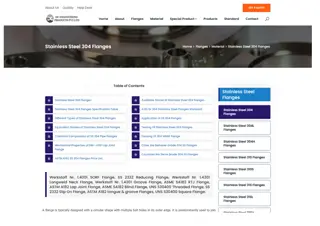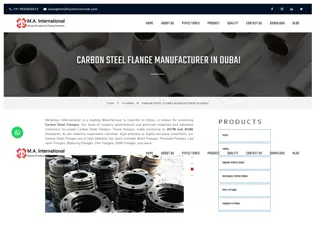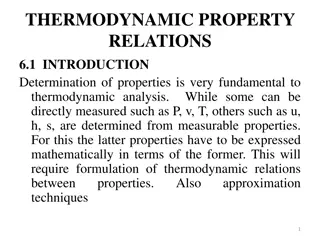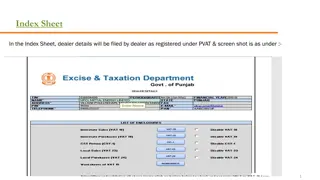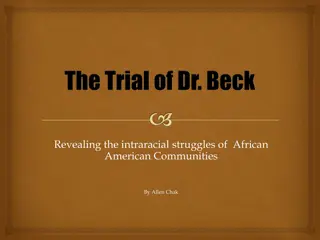Current Issues in Dealer-Manufacturer Relations: Insights from Beck Chevrolet
Explore the dynamics of dealer-manufacturer relationships through a detailed examination of Beck Chevrolet's performance and legal challenges. Delve into sales effectiveness strategies, perceived benefits, concerns, and legal implications affecting dealers pre-Beck. Gain valuable insights from industry experts on navigating complex issues in this engaging workshop.
Download Presentation

Please find below an Image/Link to download the presentation.
The content on the website is provided AS IS for your information and personal use only. It may not be sold, licensed, or shared on other websites without obtaining consent from the author.If you encounter any issues during the download, it is possible that the publisher has removed the file from their server.
You are allowed to download the files provided on this website for personal or commercial use, subject to the condition that they are used lawfully. All files are the property of their respective owners.
The content on the website is provided AS IS for your information and personal use only. It may not be sold, licensed, or shared on other websites without obtaining consent from the author.
E N D
Presentation Transcript
Fall Workshop September 7, 2017 Current Issues in Dealer Manufacturer Relations Beck Chevrolet One Year Later Aaron Jacoby, Arent Fox LLP Russell P. McRory, Arent Fox LLP Caleb Schillinger, Seyfarth Shaw LLP
Disclaimers Expressing personal views. Not speaking on behalf of any client or company. All information has been publicly disclosed. 2
How Did We Get Here? How Sales Effectiveness is Used: Measure performance vs. market potential Identify lost opportunity and likely causes Support business counseling Drive market actions Construct sales objectives Award incentives Facility guides 3
How Did We Get Here? Perceived benefits: Powerful tool actual consumer purchasing data Avoids projections, extrapolations, or estimates Segmentation provides significant adjustment Great equalizer allows comparison of different sized dealerships/markets Adjusts for economic conditions, market opportunity, and strength of brand within comparison area Business tool for dealers and manufacturers Objective, predictable, transparent, administratively convenient Art and science approach termination rare 4
How Did We Get Here? Perceived concerns: PMA definition Imprecise/Incorrect Segmentation Topography/Climate Economic conditions Demographic bias (income/age/ethnicity/etc.) Factory / other brand bias (i.e., import/domestic) Number / strength of inter-brand competitors Incentive bias (i.e., lease vs buy) Advertising bias Commuting pattern bias Allocation Can t sell them if I don t have them 5
Legal Challenges Context - termination, add point, relocation, facility requirements, buy-sell, incentive program, sales objectives, etc. Fact specific Primarily involved whether the benchmark area was sufficiently similar to the study area Does segmentation provide enough of an adjustment? Sales effectiveness upheld and rejected depending on the specific circumstances 6
Dealer Position Pre-Beck Beck performed well in other important metrics: CSI, training, working capital, advertising, pricing, pricing to consumers. Over 80% of downstate NY dealers were also failing under RSI, including many below Beck. Easy sell that downstate metro NY consumer preferences very different than more rural upstate. Made it easy to argue that Beck was not a bad dealer, but rather, that the Chevrolet brand had a larger problem in the NY metro market. Large disparity of Chevrolet brand performance upstate vs. downstate. Upstate Chevrolet had triple the market share than it did downstate. Almost three-quarters of Chevrolets were sold upstate, but only half of all cars and light trucks were sold upstate. Over 80% of Chevrolet dealers were located in upstate counties. In short, the NY State benchmark was dominated by upstate Chevrolet dealers facing consumer preferences and market conditions very different than those faced by downstate Chevrolet dealers. 7
GMs Position Pre-Beck GM had made significant structural changes to and investment in NY metro market. Beck signed a participation agreement promising improvement over 3-year period: 70, 85, 100 RSI. Beck benefitted from a significant (25%) segment adjustment. Operational issues despite assistance allocation, counseling, business plan, facility, advertising, sales manager. Beck showed no improvement in its RSI. In addition to RSI, GM considered other relevant factors. Chevrolet bias? several other downstate NY Chevrolet dealers were sales effective or had shown material improvement. Beck outsold in its own market by neighboring Chevrolet dealer. Import bias? Ford and Chrysler doing great in Yonkers (on same street as Beck). 8
Beck NYCourt of Appeals Decision: Performance Standard GM measures a dealer s sales performance by comparison to a statewide class of dealers, but adjusts the standard to reflect certain local market peculiarities with respect to one metric: local consumer purchasing preferences for certain vehicle types Yet, customer purchases are influenced not solely by preferences for a type of vehicle, for which GM accounts through its segmentation formula, but also by brand popularity and import bias. GM s exclusion of local brand popularity or import bias rendered the standard unreasonable and unfair because these preference factors constitute market challenges that impact a dealer s sales performance differently across the state. It is unlawful under section 463(2)(gg) to measure a dealer s sales performance by a standard that fails to consider the desirability of the Chevrolet brand itself as a measure of a dealer s effort and sales ability. GM essentially argues that it can set a standard that misrepresents external market forces. However, measuring the dealer s performance against a market the dealer never faces is not reasonable or fair within the meaning of section 463(2)(gg). The standard used by GM excludes local variance in market competitiveness, and masks the dealer mediocrity of which GM complains. To comply with the Dealer Act, if a franchisor intends to measure a dealer s performance based on a comparison to statewide data for other dealers, then the comparison data must take into account the market-based challenges that affect dealer success. this is an industry in which the parties hold unequal bargaining positions, and an industry standard may reflect the entrenchment of the very inequality and favoritism that the legislature sought to counterbalance in the Dealer Act. Thus, GM may not rely on a standard that is unreasonable and unfair simply because of its prevalence within an industry the legislature sought to regulate. 9 9
Beck NYCourt of Appeals Decision: Modification Provision Does a change to a franchisee's Area of Primary Responsibility or AGSSA constitute a prohibited modification to the franchise under section 463(2)(ff), even though the standard terms of the Dealer Agreement reserve the franchisor's right to alter the Area of Primary Responsibility or AGSSA in its sole discretion? We conclude that such change is not an impermissible modification within the meaning of the statute. 10 10
Beck NYCourt of Appeals Decision: Modification Provision [A] modification is not limited to a change in the franchise contract because other documents may be constituent parts of the parties' written arrangement . . . . [A] franchisor may not insulate itself from the requirements and proscriptions of section 463(2)(ff) by contractually reserving in the standard dealer agreement the power to revise an AGSSA, as GM did in this case. Otherwise, a franchisor with superior bargaining power could easily circumvent the purpose of the Dealer Act by reserving the right to change franchise terms at will, even where a change results in significant adverse affects on the dealer. The fact that the dealer agreement does not contain details about the AGSSA does not remove a franchisor's revision of the AGSSA from the ambit of section 463(2)(ff) because a change in the AGSSA is a change to the franchise. The AGSSA is a subset of a dealer's APR, which is specifically referenced in the dealer agreement. The AGSSA defines the dealer's geographic sales area and serves as an essential metric of a dealer's sales performance. As such it affects a dealer's competitive position and ability to comply with its obligation under the dealer agreement to effectively sell[ ], servic[e] and otherwise represent[ ] General Motors Products in the dealer's designated APR. In other words, a revised AGSSA has the potential to significantly impact the franchise arrangement. (Emphasis added). 11 11
Beck NYCourt of Appeals Decision: Modification Provision However . . . section 463(2)(ff)(1) is concerned only with those modifications that result in negative consequences for the dealer . . . . Thus, the only prohibited modification is one that may substantially and adversely affect the new motor vehicle dealer's rights, obligations, investment or return on investment. . . . In addition, the modification must be deemed unfair, meaning it is not undertaken in good faith; is not undertaken for good cause; or would adversely and substantially alter the rights, obligations, investment or return on investment of the franchised motor vehicle dealer under an existing franchise agreement. Given this statutory language, we cannot say that a revision to a dealer's geographic sales area categorically violates section 463(2)(ff). The revised area may not have a substantial impact or be adverse to a dealer's interests within the meaning of the statute. Indeed, a change could improve a dealer's sales performance opportunities and competitive position . . . . (Emphasis added). Rather, such change must be assessed on a case-by-case basis, upon consideration of the impact of the revision on a dealer's position. 12 12
What the Future Holds? NY Court of Appeals Decision: the comparison data must take into account the market-based challenges that affect dealer success. 13
Legislative Changes Post-Beck: Florida A licensee is prohibited from committing the following acts: (42)(a) The applicant or licensee has established, implemented, or enforced criteria for measuring the sales or service performance of any of its franchised motor vehicle dealers in this state which have a material or adverse effect on any motor vehicle dealer and which: 1. Are unfair, unreasonable, arbitrary, or inequitable; or 2. Do not include all relevant and material local and regional criteria, data, and facts. Relevant and material criteria, data, or facts include, but are not limited to, those of motor vehicle dealerships of comparable size in comparable markets. If such performance measurement criteria are based, in whole or in part, on a survey, such survey must be based on a statistically significant and valid random sample. (b) An applicant, licensee, or common entity, or an affiliate thereof, which enforces against any motor vehicle dealer any such performance measurement criteria shall, upon the request of the motor vehicle dealer, describe in writing to the motor vehicle dealer, in detail, how the performance measurement criteria were designed, calculated, established, and uniformly applied. Fla. Stat. Ann. 320.64(42)(a)-(b) (added by 2017 Fl. Laws 187 (H.B. 1175), eff. June 26, 2017) 14
Legislative Changes Post-Beck: Maryland Md. Code Ann., Transp. 15-207 ( Coercion Of Dealer Prohibited ) (e)(1) The provisions of this subsection apply notwithstanding the terms of any franchise agreement or agreement related to a franchise. (2) A manufacturer, distributor, or factory branch, whether directly or through an agent, employee, affiliate, or representative, may not require or coerce a dealer to adhere to performance standards that are not applied uniformly to other similarly situated dealers. (3)(i) Whether or not uniformly applied to other similarly situated dealers, an assigned market area or a performance standard, sales objective, or program for measuring dealership performance that may have a material effect on a dealer, including the dealer's right to a benefit or payment under any incentive or reimbursement program, and the application of the standard, sales objective, or program by a manufacturer, distributor, or factory branch shall: 1. Be fair, reasonable, and equitable; 2. Be based on accurate information; and 3. Include considerations of the demographic characteristics and consumer preferences of the population in the dealer's assigned market area, including: A. Car and truck preferences of consumers; and B. Geographic characteristics, such as natural boundaries, road conditions, and terrain, that affect car and truck shopping patterns. 2017 Md. Laws Ch. 560 (H.B. 1120) (approved May 4, 2017; effective October 1, 2017) 15
Legislative Changes Post-Beck: Maryland (3)(ii) A dealer that claims that the assignment of a market area or application of a performance standard, sales objective, or program for measuring dealership performance is unfair or unreasonable due to the manufacturer, distributor, or factory branch failing to reasonably consider demographic characteristics of the population in the dealer's assigned market area, including car and truck preferences of consumers, or due to the geographic characteristics, such as natural boundaries, road conditions, and terrain, that affect car and truck shopping patterns in the dealer's assigned marketing area, may file a claim in a court of competent jurisdiction to determine whether the design of the assigned market area or the application of the performance standard, sales objective, or program is unfair or unreasonable under this paragraph. (iii) A manufacturer, distributor, or factory branch has the burden of proving that the design of the assigned market area, or the performance standard, sales objective, or program for measuring dealership performance is fair and reasonable under this paragraph. (4)(i) If the performance standard is based on a survey, it must be shown that: 1. The survey was designed with experts; 2. The proper universe was examined; 3. A representative sample was chosen; and 4. The data was accurately reported. (ii) The manufacturer, distributor, or factory branch shall establish the objectivity of the survey process and provide this information to any dealer of the same line make covered by the survey on request. 2017 Md. Laws Ch. 560 (H.B. 1120) (approved May 4, 2017; effective October 1, 2017) 16
Legislative Changes Post-Beck: Illinois Il. St. Ch. 815, 710/12(d) ( Arbitration; administrative proceedings; civil actions; determining good cause ) In proceedings under subsection (a) or (b), when determining whether good cause has been established for cancelling, terminating, refusing to extend or renew, or changing or modifying the obligations of the motor vehicle dealer as a condition to offering a renewal, replacement, or succeeding franchise or selling agreement, the arbitrators or Board shall consider all relevant circumstances in accordance with subsection (v) of Section 2 of this Act, including but not limited to: . . . (9) The extent to which local market factors in the dealer s market area presented by the dealer impacted the dealer s performance. 2017 Ill. Legis. Serv. P.A. 100-308 (S.B. 1687) (approved and effective Aug. 24, 2017) 17
Legislative Changes Post-Beck: Montana Mont. Code Ann. 61-4-207 ( Determination Of Good Cause ) (1) In determining whether good cause has been established for terminating or not continuing a franchise, the department shall take into consideration all the existing circumstances, including but not limited to: (a) the franchisee s sales in relation to the Montana market that are essential, reasonable, not discriminatory, and that take into account the franchisee s local market variations beyond adjusting for the local popularity of general vehicle types; . . . . 2017 Mont. Laws Ch. 92 (S.B. 89) (approved and effective Mar. 23, 2017) 18
Legislative Changes Post-Beck: Ohio Ohio Rev. Code Ann. 4517.55 ( Circumstances Constituting Good Cause To Terminate Franchise ) (C) Prior to a final determination by a franchisor that a franchisee has failed to achieve any performance criteria for purposes of any action under this section, the franchisor shall give the franchisee a reasonable opportunity to present evidence demonstrating the effect of local market conditions that materially and adversely affected the franchisee s performance. If a franchisor makes a final decision related to performance criteria without allowing the franchisee the reasonable opportunity to present evidence, or does not consider the effect of the local market conditions on the franchisee s performance, the performance criteria is deemed unreasonable under division (B)(5) of this section. 2016 Ohio Laws File 106 (Sub. S.B. 242) (approved June 14, 2016; effective Sept. 14, 2016) 19
Legislative Changes Post-Beck: Ohio Ohio Rev. Code Ann. 4517.01 ( Definitions ) As used in sections 4517.01 to 4517.65 of the Revised Code: . . . (MM) Local market conditions includes, but is not limited to: (1) Demographics in the franchisee s area; (2) Geographical and market characteristics in the franchisee s area; (3) Local economic circumstances; (4) The proximity of other motor vehicle dealers of the same line-make; (5) The proximity of motor vehicle manufacturing facilities; (6) The buying patterns of motor vehicle purchasers; (7) Customer drive time and drive distance. 2016 Ohio Laws File 106 (Sub. S.B. 242) (approved June 14, 2016; effective Sept. 14, 2016) 20
Legislative Changes Post-Beck: Ohio Ohio Rev. Code Ann. 4517.59 ( Actions Prohibited To Franchisors ) (A) Notwithstanding the terms, provisions, or conditions of any agreement, franchise, or waiver, no franchisor shall: . . . (6) Do any of the following: . . . (d) Unfairly change or amend unilaterally a franchisee s allotment of motor vehicles or quota, sales expectancy, sales penetration, or geographic area of responsibility without reasonable cause. Prior to changing or amending a franchisee s geographic area of responsibility, the franchisor shall give the franchisee, other than a franchisee who deals in recreational vehicles, a reasonable opportunity to present relevant evidence demonstrating the effect of local market conditions that may materially and adversely affect the franchisee s proposed new geographic area of responsibility. Any final decision made by the franchisor without considering such local market conditions shall be considered unreasonable. 2016 Ohio Laws File 106 (Sub. S.B. 242) (approved June 14, 2016; effective Sept. 14, 2016) 21
Decisions Post-Beck: Wide World v. Maserati (NY DMV) MNA s positon is that the Bonus Program is an incentive program that is offered to all dealers in the State which is offered on a proportionately equal basis and as such is allowed under Section 463.2(g) of the FMVDA. Interestingly the Bonus Program is not mentioned in MNA s New Agreement . . . under section 13D which is entitled Sales Incentive Programs . Also the Bonus Program is not an objective program. In other words the incentives are only achieved by MNA s subjective determination as to whether the Program goals have been met. If WW has been getting a $100,000.00 vehicle for $96,000.00 for the term of the agreement for the last 15 years is the actual price of the vehicle $96,000.00 no matter how MNA designates the payment? If the 4% is on every vehicle sold, it can hardly be called an incentive program. WW s loss of the present assured 4% holdback for the 2% holdback and the subjective Bonus Program by reducing their present long standing expected margin both as to the amount received from MNA and also due to the increased administrative cost to administer the Bonus Program, effectively and significantly impacts its return on investment and as such is a modification of its present franchise arrangement. . . . [T]he margin included in the Bonus Program and the holdback is a modification of the Present Agreement . . . . 22
Decisions Post-Beck: CMS VW v. VGoA (2d Cir.) CMS Volkswagen . . . appeals from the June 6, 2014 opinion and order of the United States District Court for the Southern District of New York dismissing its complaint brought pursuant to the New York Franchised Motor Vehicle Dealer Act. While this appeal was pending, the New York Court of Appeals issued its opinion in Beck Chevrolet Co. v. Gen. Motors LLC, [which] held that franchisor sales performance standards that rely on statewide data that do not take into account local brand popularity violates Section 463(2)(gg) of the Dealer Act. The district court when it rendered its opinion did not have the benefit of the New York Court of Appeals' decision, which rejected the statutory interpretation and conclusions of a case on which the district court here relied. We remand so that the district court may consider Beck's impact in the first instance. 23
Decisions Post-Beck: JJM Sunrise/Luxury Autos v. Audi Consolidated actions in N.Y. state court, challenging establishment of new Audi dealership on Long Island. Dealers moved in limine to preclude Audi s expert witness from proffering opinions based on segment-adjusted market share analysis. Dealers relied on Beck and argued that expert would attempt to justify [Audi s] decision to permit a new dealership in the local market based upon a flawed and discredited methodology that does not account for local market conditions or consumer preferences. Court rejected argument and refused to extend scope of Beck: The rationale and holding of [Beck], however, are limited to the circumstances of that case, as clearly noted by the Court itself . . . . The issues relevant in the instant actions revolve around the defendant franchisor s decision to permit establishment of a new dealership in an allegedly underperforming region; such issues are distinct from the issue of whether a franchisor s performance standards are lawful under VTL 463(2)(gg). (Order dated Jan. 20, 2017, Doc. No. 306) 24
Decisions Post-Beck: Van Wie Chevrolet Van Wie sues GM and Sharon Chevrolet in N.Y. state court to enjoin relocation of Sharon. Trial court grants motion to dismiss claims against Sharon, and all but two claims against GM: (1) unlawful modification of franchise agreement in violation of Veh. & Traf. Law 463(2)(ff)(1), and (2) breach of fiduciary duty. Trial court later grants summary judgment for Van Wie on modification claim and for GM on breach of fiduciary duty claim. Both parties appeal. Van Wie argues GM s approval of relocation would result in modification of its APR and its franchise, and modification not undertaken in good faith or for good cause. Intermediate appellate court reverses trial court and rules in favor of GM: References holding in Beck that a change in AGGSA is a change to franchise. (38 N.Y.S.3d 662, 667). But not all changes are actionable 463(2)(ff)(1) applies only to modifications resulting in negative consequences for dealer, and changes must be assessed on case-by-case basis. (Id.) Approval of relocation, by itself, not a modification of franchise requiring notice to dealer. Notice not required until there is a change to APR. (Id. at 667-68). 25
Changes to RSI Post-Beck Applies to New York GM dealers. Starting with Q1 2017 Dealer Retail Sales Performance Reviews ( SPR ), GM will provide new data based on the dealer s sales at the DMA level. DMA = Designated Market Area as defined by Nielsen, where dealer is located. GM may consider additional factors before determining a dealer is sales-deficient. 26
Changes to RSI Post-Beck Additional factors GM may consider: Dealer s APR/AGSSA configuration; The brand s RRI in the dealer s APR/AGSSA; The proximity and potential impact of any competitive Original Equipment Manufacturer ( OEM ) manufacturing facility; Major facility renovation and/or construction; Major road construction impacting dealership traffic; Any other relevant factor that the dealer has brought to GM s attention; Any other factor that GM Deems relevant to its analysis. 27
Conclusion Where does that leave us? Dealer view Manufacturer view 29







